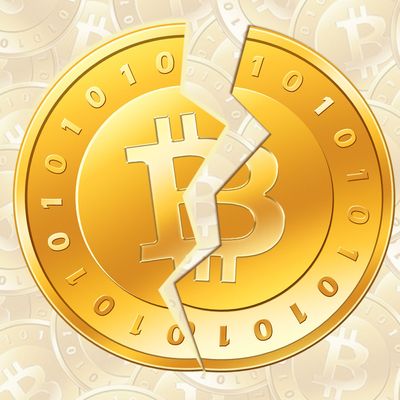
Well, nothing gold can stay. And so, as surely as the Bitcoin bubble expanded, so the Bitcoin bubble appears to be on its way back in.
We may never know what started today’s crash in the price of Bitcoin. Some Bitcoin enthusiasts are blaming a DDOS attack on prominent Bitcoin exchanges, while others are, somewhat less credibly, blaming a government plot to destroy faith in the Internet’s favorite crypto-currency. But regardless of why, something major is happening. My 93.523120 percent of a Bitcoin, which I bought for $124.81 exactly a week ago and saw shoot up to be worth nearly $250 at its peak, is now worth about $140. (Although given Bitcoin’s volatility, that price is probably obsolete as I write this.)
What’s been most interesting to watch, throughout this whole weeklong saga, is the relationship between the old Bitcoin community — the diehards who have been touting the merits of virtual currency since 2009 and who populate the threads on the Bitcoin subReddit — and the Johnny-come-latelies like me, who had heard of Bitcoin and vaguely knew what it was, but didn’t snap to attention and actually consider buying in until the price was on a wild upswing.
Most of the Bitcoin originals I’ve talked to over the course of the last week have been skeptical of Bitcoin noobs. That’s understandable. Because while, sure, a sudden flock of interested buyers jacks up the price of Bitcoins and makes a few early adopters an insanely large amount of money very quickly, most of those buyers won’t stick around for long. And, moreover, making money isn’t really the end goal of the Bitcoin movement. The goal is to establish legitimacy and draw attention to the shortcomings of government-controlled currency. For the last week, Bitcoin’s price swings have made it seem anything but legitimate.
There is a case to be made that the sudden upswing in interest in Bitcoins has been a good thing for the alternative-currency movement, regardless of how far prices fall in the coming days. As I pointed out when I bought my Bitcoin (and I think was apparent when I interviewed BitInstant CEO Charlie Shrem this week), the main problem with Bitcoin right now is that the entire infrastructure supporting it is a mess. Money is too hard to get in and out of the system, exchanges to buy and sell Bitcoin are creaking under the weight of demand, and hackers can steal Bitcoins with no recourse.
Some hard-core Bitcoin enthusiasts, like Erik Voorhees, think that the current surge of attention paid to Bitcoin will help on that front, by giving venture capitalists a reason to invest in start-ups like Coinsetter that will, ultimately, make the market more resilient and sophisticated.
“Well remember it’s important to make a distinction between buying coins to speculate on price and building up infrastructure,” Voorhees told BuzzFeed’s John Herrman. “Those who are into Bitcoin should do the latter, full time. The speculation is separate … it’s for anyone who wants to take a gamble on the volatile market.”
Those enthusiasts also take the tack that the more people who hear about Bitcoin, the more retail establishments will begin to accept it as currency, and the more its purchasing power will begin to resemble the dollar. (Already this week, we’ve had a winery and a bar in midtown begin accepting Bitcoins.)
But what these optimists miss is that people don’t just use the dollar because it’s accepted at their favorite wineries. They use it because they trust it. They trust that if five dollars can buy a box of Cheerios today, it can buy one tomorrow too. And that trust is built on the fact that the U.S. dollar is backed by a government, exchanged in a market that is controlled by regulations, and controlled in a monetary system that is overseen by the Federal Reserve.
There is a certain irony to the fact that Bitcoin enthusiasts are currently blaming today’s price action on market manipulation, and wishing that there were some mechanism — like a circuit-breaker on exchanges — to keep prices somewhat stable. Because those measures would require a unilateral decision by a policy authority, and unilateral decisions by policy authorities are exactly what Bitcoins were created to protest.
When the financial system nearly collapsed in 2008, we had tools to stop the economy from coming to a total, unfathomable halt. We had the Fed’s emergency borrowing window. We had TARP. We had depositor guarantees, and we’re putting in place laws to try to keep a similar crisis from happening again.
The Bitcoin economy, on the other hand, can’t do anything to stop a collapse once it’s in motion. And the current panic of Bitcoin enthusiasts proves that while people hate currency manipulation and government intervention in boom times, they’re slightly fonder of it when the sky is falling.





























